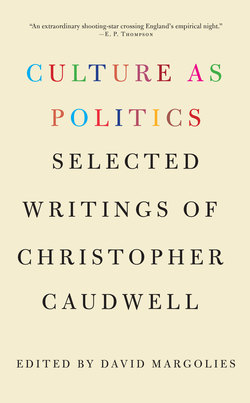Читать книгу Culture as Politics - Christopher Caudwell - Страница 7
На сайте Литреса книга снята с продажи.
ОглавлениеPART I
Studies in a Dying Culture
INTRODUCTION
Studies in a Dying Culture was published by The Bodley Head in 1938 and was reprinted five times in the decade after the war. It was Caudwell’s most accessible theoretical work and probably the most popular at the time. Whereas Illusion and Reality can seem rather formidable, with a bibliography that Caudwell jokingly said was designed to terrify reviewers, Studies contains more clearly focused essays which are fairly short and must seem more manageable. The topics had a more obvious relevance than the ‘study of the sources of poetry’ which the subtitle of Illusion and Reality suggested.
The essays of Studies were radical, explicitly so, and the subjects were examined against a political background. The rise of fascism and the growing resistance from the Popular Front – the People’s Front as it was in Britain – made the issues sharper. Writers as citizens and as writers had to take sides; Writers’ International allied itself to ‘the class that will build socialism’. Caudwell’s joining the International Brigades to fight fascism confirmed his citizen commitment; Studies is a clear demonstration of his commitment as a writer.
The effect of writing from commitment meant that the balance of explanation and argument shifted; the essays were propagandistic in their advocacy. They are more tendentious than his writing that is not shaped to a political purpose, but what they lose in nuance they gain in rhetorical vigour. They have a tremendous energy, which sometimes overruns their logic. In evaluating Freud’s contribution to human understanding, for example, Caudwell’s conclusions have a good balance but he commits occasional excesses in passing which he then modifies, for example, ‘Freudism, attempting to cure civilisation of its instinctive distortions, points the way to Nazism.’ Freud, he says explicitly, rejects fascism but promotes a bourgeois misunderstanding of the nature of society which can point to fascism.
Similarly, Caudwell says of D. H. Lawrence, ‘it is Lawrence’s final tragedy that his solution was ultimately Fascist and not Communist’ because he is advocating a return to the primitive (he is not taking up fascist politics). The point for Caudwell is that Lawrence’s reaction to the decline of human relations is backward-looking: he refuses to understand that society is what makes humans human, whereas a blind retreat into the body in fact negates the very thing that transforms the beast into the human. This essay is Caudwell’s most eloquent plea to recognise the fundamental role society plays for humanity.
The final essay of the book, ‘Liberty’, is one of Caudwell’s most thoroughly developed arguments. Again, he is insistent about the fundamental role of society, without which liberty is meaningless. Politically, it is one of the most important pieces of his writing, not because of party advocacy, but because it examines views about freedom that are important in making political choices, are commonly held throughout bourgeois culture and are fundamentally wrong.
These three essays are, I think, the most relevant of the collection and best stand the course of time. They are presented in the order in which they appear in the original volume. The essays I have not included were on George Bernard Shaw, T. E. Lawrence, H. G. Wells, Pacifism and Violence, and Love.
The appearance of * * * in the essays indicates text that has been left out of this edition.
